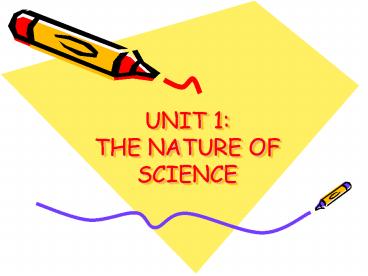UNIT 1: THE NATURE OF SCIENCE - PowerPoint PPT Presentation
1 / 10
Title:
UNIT 1: THE NATURE OF SCIENCE
Description:
... the universe branches of science biology chemistry physics geology astronomy meteorology zoology botany paleontology ecology ... design an experiment ... – PowerPoint PPT presentation
Number of Views:112
Avg rating:3.0/5.0
Title: UNIT 1: THE NATURE OF SCIENCE
1
UNIT 1 THE NATURE OF SCIENCE
2
GOAL OF SCIENCE
- TO EXPLAIN AND UNDERSTAND THE WORLD AROUND US
- TECHNOLOGY USING SCIENTIFIC KNOWLEDGE AND TOOLS
IN A USEFUL WAY - CHANGING BODY OF INFORMATION
- OBSERVATIONS ? QUESTIONS ? HYPOTHESIS ?
EXPERIMENT ? CONCLUSION - THEORY BEST EXPLANATION SUPPORTED BY MANY
DIFFERENT EXPERIMENTS ALL LEADING TO THE SAME
CONCLUSIONS - LAW SPECIFIC STATEMENT THAT IS TESTED AND IS
BELIEVED TO BE TRUE THROUGHOUT THE UNIVERSE
3
BRANCHES OF SCIENCE
- BIOLOGY
- CHEMISTRY
- PHYSICS
- GEOLOGY
- ASTRONOMY
- METEOROLOGY
- ZOOLOGY
- BOTANY
- PALEONTOLOGY
- ECOLOGY
- ENVIRONMENTAL SCIENCE
- GENETICS
- AERODYNAMICS
- ANATOMY
- PHYSIOLOGY
- MICROBIOLOGY
- ENTOMOLOGY
- FORENSICS
- PATHOLOGY
- FORESTRY
4
Observations vs. Inferences
- Observation information directly collected
using the five senses - Qualitative describes
- Color, texture, smell
- Quantitative actual measurable number
- Time, distance, amount
- Inference a logical statement based on the
observations
5
SCIENTIFIC METHOD
- State the Problem
- Research
- Form a Hypothesis
- An educated guess
- Testable
- Design an Experiment
- Variable single factor you are testing
- Only test 1 in an experiment
- Control setup without the variable
- Used for comparison
6
SCIENTIFIC METHOD
- Record and Analyze Data
- Dependent variable what you measure
- Responding variable
- Independent variable what you are testing
- Manipulated variable
- Form a Conlusion
- Accept or reject hypothesis
- If reject, change hypothesis and repeat
- Tell Scientific Community
- Retest
- Further Testing
7
Metric System
- Advantages
- Powers of 10
- Convert by moving decimals
- Universal for all scientist
- Converting Metric to Metric
- Know prefixes kilo- (1,000) hecta- (100)
deka- (10) base unit (1) deci- (.1) centi-
(.01) milli- (.001) - Other prefixes Giga (1 billion), Mega (1
million), Micro (1 millionth) Nano (1
billionth) - Label prefixes on horizontal line, starting with
kilo on left and go to milli on right - Start with what you know and count spaces to get
to what you want to convert it to - Move decimal same number of places in same
direction
8
Measuring with the Metric System
- Distance
- Base Unit - meters
- Mass the amount of matter in an object
- Base unit - grams
- Weight - force of gravity on an object
- Go into outerspace weight changes, mass does
not - Triple beam balance or scale
9
Measuring with the Metric System
- Volume amount of space an object takes up
- Base Unit Liter
- Also can be measure in cubic meters, cubic
centimeters, etc. - 1 mL 1 cm3
- Graduated Cylinder
- Meniscus curved portion of top of liquid
- Calculate volume of solid L X W X H
10
Measuring with the Metric System
- Time
- Base unit seconds
- Not always based on units of 10
- 60 sec in 1 minute 60 min. in 1 hour 24 hours
in 1 day etc. - Temperature measure of the average speed of
molecules - Heat amount of thermal energy
- Base units degrees celsius or Kelvin
- K oC 273 or oC K - 273
- oC (oF 32) X .5556 or oF (1.8 X oC)
32 - Absolute Zero coldest temperature possible
- 0 K or -273 oC































